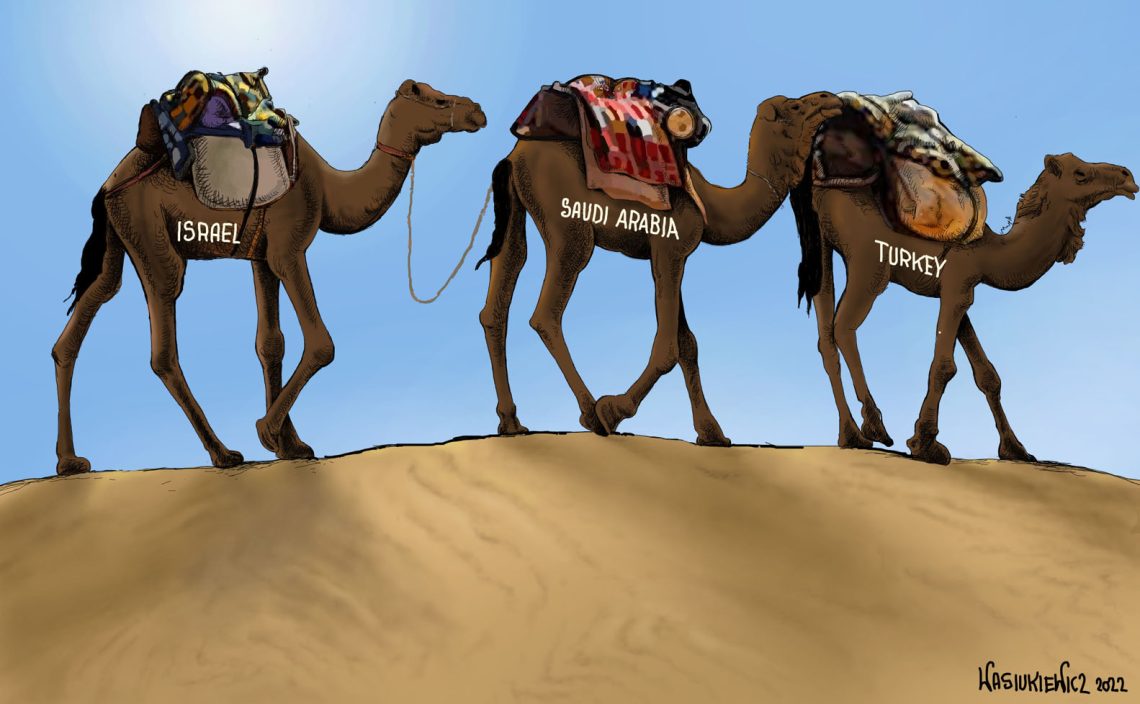The Middle East without foreign interventions
Middle Eastern and North African countries, after decades of turmoil, are starting to come together to find solutions to regional issues.

The Middle East and North Africa have been political hotspots for the last 70 years. This was not limited to the Israeli-Palestinian and Arab conflicts. The interests of global and regional powers clashed there, with alliances often changing. New borders, carved out of the Ottoman Empire by the victors of World War I, led to the creation of artificial nations and the emergence of non-state political and military actors.
The region unfortunately allowed foreign actors to play a role in their interstate relations. This increased tensions between local powers, but also affected the internal affairs of these countries. It is significant that the agreement limiting Iran’s nuclear aspirations, the Joint Comprehensive Plan of Action (JCPOA) was only signed by Tehran and the permanent members of the United Nations Security Council (the United States, Russia, France, the United Kingdom and China) as well as Germany. None of the neighboring countries or regional powers, like Turkey, Israel, Saudi Arabia or Egypt, were involved. The deal had important flaws, and did not demand that Iran halt its sponsoring of terrorist activities and its warmongering in Lebanon and Yemen. The JCPOA was then canceled by the Trump administration. Iran remained a major sponsor of terrorism in the region and beyond.
In other areas, diverting interests between global and regional powers led to wars, unrest, and diplomatic and economic conflicts. The main regional powers were Egypt, Israel, Saudi Arabia, Turkey and Iran. Turkey, a NATO member, maintained good relations with Israel until the mid-2000s but otherwise tended to not get involved in Middle Eastern politics.
Region in flux
In the 1960s, Egypt under Gamal Abdel Nasser tried to play a leading role in the region. Cairo pushed for a socialist union of Arab countries, threatened Israel and caused unrest in Yemen, while still managing to remain unaligned throughout the Cold War.
At the time, Mohammad Reza Shah’s Iran played a stabilizing role – but this ended in 1979 when Ayatollah Khomeini took over and created the Islamic Republic. A bloodbath ensued during the brutal Iran-Iraq war. Chemical weapons were used, especially by Iraqi leader Saddam Hussein. Iran was supported by the Soviets and Iraq had Washington’s tacit backing.
The West also carried out direct military interventions during the two Iraq wars and bombings in Muammar Qaddafi’s Libya.
The continuing threat posed by Tehran’s subversive activities in Iraq, Syria, Lebanon and Yemen is uniting the Arab countries.
With the start of the so-called “Arab Spring” in 2011, a protest movement triggered by food price inflation, the cards were reshuffled. The military took over in Egypt to cast out a radical Islamist government led by the Muslim Brotherhood after the fall of President Hosni Mubarak. He resigned under pressure from protesters, but especially from then U.S. President Barack Obama. In Libya, Qaddafi, a tyrant and sponsor of terrorism, was killed, and the civil war that followed is still unresolved a decade later. Opposing factions have various foreign sponsors. Meanwhile, Syria’s devastating civil war started as a proxy conflict between Iran and Saudi Arabia, combined with pressure from the U.S., Russia, Turkey and Europe. The rise of Islamic State (also known as ISIS or Daesh) complicated matters, and Kurdish fighters in both Iraq and Syria contributed to crushing the terrorist organization.
Under Recep Tayyip Erdogan – first as prime minister, then as president – Turkey started to play a more active role in the region, becoming a crucial actor in the conflict in neighboring Syria. Moreover, Kurdish terrorism caused problems for Ankara.
Relations between Turkey and Israel started to deteriorate some 15 years ago. Ankara adopted a more Islamic (although not radical) leaning and antagonized President El-Sisi’s Egypt. This affected the country’s relations with Saudi Arabia, which supports Mr. El-Sisi.
However, the area has begun to come together and is trying to find regional solutions. Turkey and Saudi Arabia are now important players. The continuing threat posed by Tehran’s subversive activities in Iraq, Syria, Lebanon and Yemen is uniting the Arab countries. The Abraham Accords agreement between Israel and the United Arab Emirates, unofficially approved by Saudi Arabia, is a sign of this regional rapprochement.
Turkey’s relations with key countries are improving, not only with Israel but also with Saudi Arabia – as demonstrated by the fact that Ankara has now transferred the jurisdiction for procedures concerning the Jamal Khashoggi murder to Riyadh.
Hopefully, this trend will limit Iran’s harmful activities. Lifting sanctions without Tehran’s commitment to stop sponsoring terrorism would have negative consequences. In this context, it would be preferable if the JCPOA agreement in its proposed form was not renewed. This would also improve Israel’s security and create a more favorable environment to solve the Palestinian conflict.
